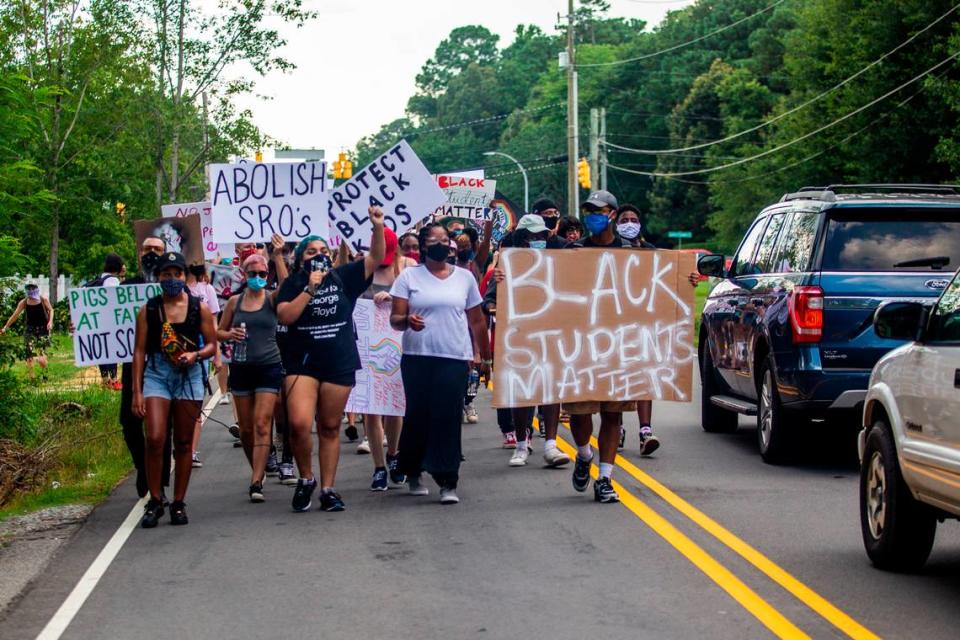Police will stay in Wake schools for 3 more years. Here’s what new plan will look like.
Police officers will remain in Wake County schools for the next three years under new rules that are supposed to set tighter limits on what they do on campus.
The Wake County school board approved this week an agreement with local law enforcement agencies governing the role of school resource officers through June 2024. The board also approved contracts with the different agencies to provide school resource officers for the upcoming school year.
Wake resisted the nationwide push to remove police from schools. But after hearing concerns from some activists, the new memorandum of understanding adds wording about when officers should intervene and how much force they should use.
“What we have is better for the district, better for students, better for the community,” school board chairman Keith Sutton said in an interview after the vote. “Does it provide what some of the advocates wanted in terms of a complete removal of law enforcement from our schools?
“It doesn’t provide that, but I do think it gives us tighter restrains and controls.”
But the changes still fall short for those who say police should be replaced by counselors at schools.
“I truly appreciate the work that you all have done to make an MOU that is fairer, but it seems to me that the money spent on our SRO program would be better spent on behavioral/crisis interventionists,” Renee Sekel, a parent, wrote in comments submitted to this week’s board meeting.
Backlash after death of George Floyd
The county’s 11 law enforcement agencies currently provide 75 armed officers at high schools, middle schools and some elementary schools. The district pays $1.1 million a year for the officers.
But the role of police in schools has come under greater scrutiny following the May 2020 murder of George Floyd by a Minneapolis police officer.
Floyd’s death spawned Black Lives Matter protests nationally and in the Triangle. The Wake County Black Student Coalition held multiple protests over the past year calling for “counselors, not cops.”

“It is disgraceful to have paid police officers creating a culture of criminality and punishment in the schools,” Katie Haberman wrote in comments to the school board. “It’s outrageous.”
Since Floyd’s death, 33 school districts have eliminated their school police officers, and Chicago and Los Angeles significantly cut the school-policing portion of their budgets, according to Education Week.
When Wake renewed the SRO agreement last year, the board promised to get more community input before a new plan was adopted. What followed is a series of meetings and surveys with school employees, students, parents, community members and law enforcement agencies.
“No one can say that we haven’t had voices and feedback from all parties, and it might not be what everyone thinks is the perfect plan,” board member Chris Heagarty said at Tuesday’s meeting. “But I think everyone has had input and we really have gone through a very deliberative process to get to where we are today.”
Rules of when police should intervene
Under the new agreement, officers are told they will rarely be involved in the least serious student offenses, such as not following a school employees’ orders, inappropriate language and dress code violations. Those issues would be handled by the school.
The MOU says officers may “intermittently” be involved when it comes to more serious violations such as property damage, theft, indecent exposure and sexual behavior.
But the agreement says the majority of the times officers will intervene are for the most serious offenses, such as possession of controlled substances, gang activity, possession of weapons, assault on a student or adult and threats of mass violence.
The agreement asks the 11 law enforcement agencies to “give due consideration to the specific revisions” on use of force recommended by Governor Roy Cooper’s Task Force on Racial Equity in Law Enforcement. Among the task force’s recommendations was that officers use the minimum amount of force reasonably necessary to apprehend a suspect.
Six law enforcement agencies, who are in charge of 80% of the school resource officers, have agreed to the new memorandum of understanding, according to Russ Smith, the district’s senior director of security. He said the other five agencies are also expected to sign on.
“We didn’t get all of the things that we wanted, but this is an act of compromise if you will,” said Sutton, the board chairman.

